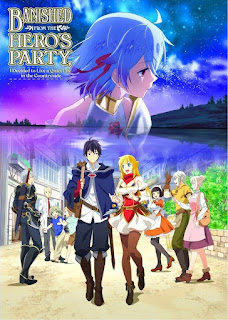Anime Spotlight #31: Banished from the Hero's Party, I Decided to Live a Quiet Life in the Countryside
Article by Sean Wilkinson,
a.k.a. the Animeister
Back in 2021 or so, an anime trend started where there seemed to be one fantasy series after another about a member of "the Hero's party" (read: the main character group from every JRPG ever) being kicked out of the group or quitting, and choosing to switch sides for revenge or seeking happiness in ordinary life.
To make Just the Ticket part of your ordinary happiness, please remember to Become A Ticketholder if you haven't already, commenting at the bottom of this post, helping out my ad revenue as you read so I don't get banished from the Worldwide Crawly-Wawly Space, and following my "heroics" on Tumblr, Reddit, Facebook, and LinkedIn to like what you see and receive the latest Blessings of news on my content.
Beginning its still-ongoing life as a lengthily-titled novel-turned-light novel-turned-manga-turned-finished anime in 2017, Banished From the Hero's Party, I Decided to Live A Quiet Life In the Countryside takes place in a fantasy world where there are two different colored moons (this polylunar aesthetic also seemed to be a thing around that time, with the adorably awesome Reincarnated As A Sword going up to about seven moons) and the generic RPG skill/job/class/level system takes the form of divine Blessings that Awaken in childhood and make people compulsively good at one thing. Depending on the Blessing, that can result in superhuman abilities like enhanced strength, speed, senses, or stealth. Other Blessings can make people good at magic. But the downside to some Blessings is that they can compel people to fight, kill, train themselves to death, waste resources through cooking or harvesting, or in the case of the Hero's Blessing, it can make them obsessed with wiping out evil, shut off their emotions and senses, and give them unrivaled strength and immunity to all debuffs (basically creating a Hero who is a fanatical sociopath who will never know adversity and cannot experience anything that makes life interesting). It's surprisingly deep and bleak as magic systems go, tackling things like religious fanaticism, mental illness, addictive behavior, social and individual identity, free will, emotional intelligence, and more. The focal characters are Red (a.k.a. Gideon, the Hero Party's scout, scavenger, and pack mule, who got the first part of the title done to him and will spend the series doing the second part of the title because one of his party members was a jealous ass) and Rit, a princess and high-ranking adventurer whom Red has a crush on.
They open an apothecary shop together (because apothecaries also started being a thing in anime and manga since the year that the real world had that "little medical emergency" in every country that starts and ends with letters and has a geopolitical border around it) and start making plans to live together. Aside from the couple being adorable and doing slice-of-life things until Red's past catches up to him and he has to kick ass (and his sister, Ruti--because somebody glued the pages of The Big Book Of Baby Names together, except for "R," before they handed it to series author Zappon--being the aforementioned Hero), I barely remember the first season.
When the second season rolled around, Red, Rit, and Ruti were the only characters I could immediately remember. Tisse (which I thought was spelled "Chise," until I read the Wikipedia entry last week to remind myself of almost everything), the underaged assassin with a too-suggestive design and a cute pet spider, was also fairly easy to remember. But everyone else, I just went, "okay; I guess they're here and kind of important, too?" I almost didn't even watch the second season beyond a certain episode (which involves a hot spring bath and Ruti telling Tisse that she wants to...be her own, soon-to-be-married brother's concubine!). But against my better judgment, I kept watching, and the dreaded incest harem never became a thing, thank the Anime Pope. Instead, we get a new Hero named Van entering the picture now that Ruti has fulfilled her duty and taken on a new Blessing. Having been raised in the church, Van has a more fanatical connection to the Hero's Blessing than Ruti did, and often misinterprets and overreacts to behaviors and lifestyles that seem evil, blasphemous, or contrary to the "natural order" (like, if you cut too big of a slice of cake, or more likely, if you choose the safe option in a game of Cake Or Death, he would choose Death for you because everything is a sin if you're not the Hero or marching to your death behind him). When he comes to blows with Ruti, a crisis of faith drives Van insane and he develops a Highlander fixation on killing her, forcing Red to step in and make things better by making them worse until everyone forgets he made things worse and they let him make things better again.
Banished From the Hero's Party is a terribly forgettable and forgettably terrible franchise built on a more engaging relationship and a more profound magic system than it deserves. Watch it for its good qualities if you like that kind of thing, but don't waste your time otherwise.
Once again, please remember to Become A Ticketholder if you haven't already, comment at the bottom of this post, help out my ad revenue as you read so I don't get banished from the Worldwide Crawly-Wawly Space, and follow my "heroics" on Tumblr, Reddit, Facebook, and LinkedIn to like what you see and receive the latest Blessings of news on my content.
Animeister,
Out.




Comments
Post a Comment